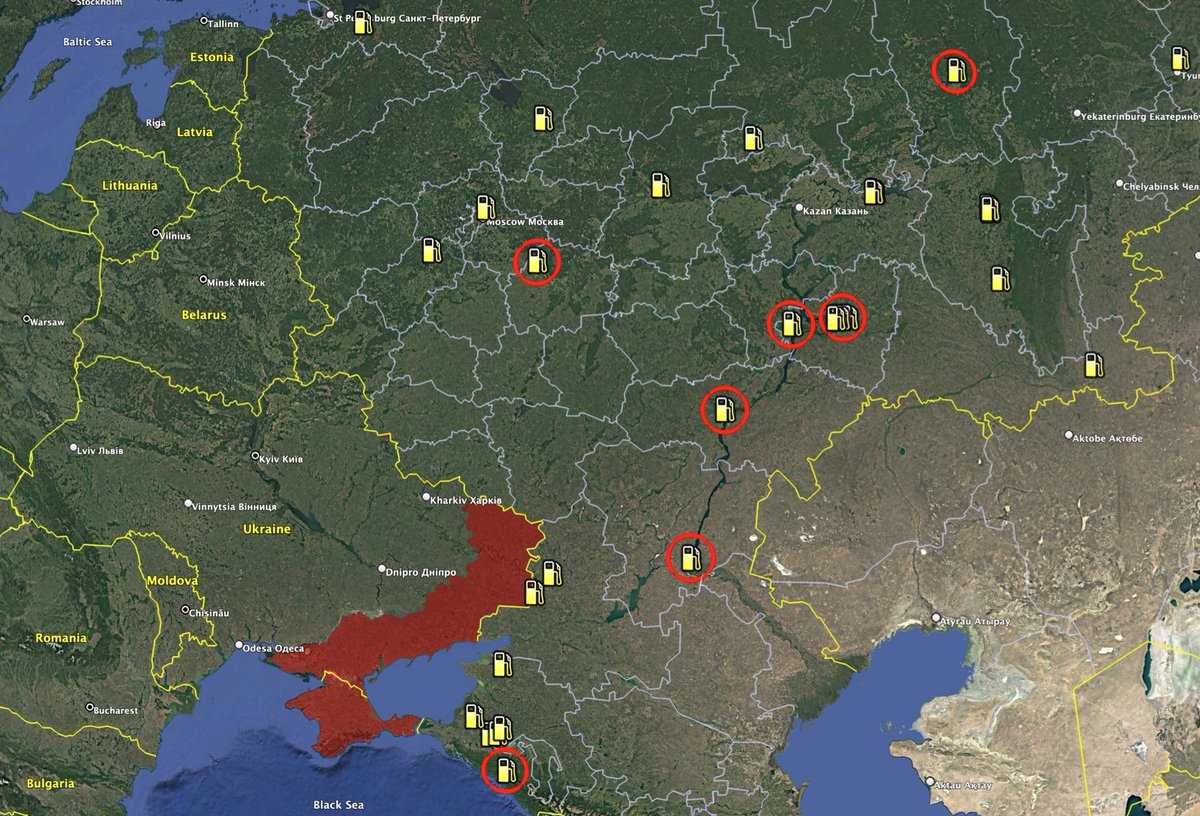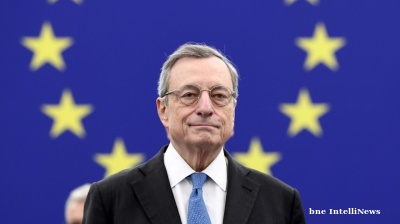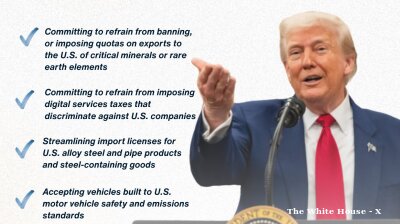US President Donald Trump imposed his first sanctions on Russia’s two largest oil companies on October 22, the state-owned Rosneft and the privately-owned Lukoil in the latest flip flop by the US president.
The move came shortly after Trump held a telephone conversation with Putin on October 17 who suggested the two meet in Budapest. The call came the day before Trump met with Ukrainian President Volodymyr Zelenskiy who was lobbying for the delivery of Tomahawk missiles, but left that meeting empty handed, as Trump swung back behind Russian again.
But following a call between Russian Foreign Minister Sergei Lavrov and Secretary of State Marco Rubio a few days later, the Hungarian meeting was put on hold as it became clear there was no middle ground for discussions. In a fit of pique, the increasingly frustrated Trump finally pulled the trigger on new sanctions on Russia, the Office of Foreign Assets Control (OFAC) announced.
“I’m going to have to know that we’re going to have a deal. I’m not going to be wasting my time. I’ve always had a very great relationship with Vladimir Putin, but this has been very disappointing,” Trump told journalists on Air Force One on his way to a five-day tour of Asia.
“Now is the time to stop the killing and for an immediate ceasefire,” said Secretary of the Treasury Scott Bessent in a statement. “Given President Putin’s refusal to end this senseless war, Treasury is sanctioning Russia’s two largest oil companies that fund the Kremlin’s war machine. Treasury is prepared to take further action if necessary to support President Trump’s effort to end yet another war. We encourage our allies to join us and adhere to these sanctions.”
The sanctions were announced on October 22 and coincide with the European Union’s nineteenth sanctions package, which includes an accelerated ban on Russian LNG imports. The United Kingdom also sanctioned Rosneft and Lukoil last week, as Western allies continue to tighten pressure on Moscow more than three years into the conflict.
The US Treasury Department confirmed that it was prepared to take further action and called on Moscow to agree immediately to a ceasefire in its war against Ukraine, which began in February 2022. Following the Alaska summit on August 15, Trump shifted his ground again and dropped the call for a 30-day ceasefire that he himself initiated in April, supporting Putin’s call for the immediate start to the more difficult and more extensive peace talks.
The new sanctions freeze any US-based assets held by Rosneft and Lukoil and open the door to secondary sanctions on foreign financial institutions that continue to conduct transactions with the blacklisted firms.
Rosneft and Lukoil account for around two-thirds of the 4.4mn barrels of crude Russia exports each day, according to Argus media consultancy, as cited by Politico. However, Chinese and Indian buyers, Russia’s two largest oil trading partners, are likely to continue importing from Moscow and have been so far unaffected by the oil sanctions. Nevertheless, there are reports that both China and India are preparing to reduce imports of Russian oil.
The New US sanctions don’t contain a carve-out for pipeline oil. China imports around 800,000 barrels a day of Russian oil via the ESPO pipeline that runs from Siberia to the Far East – Russia’s only significant eastward bound pipeline. Previous sanctions effectively only targeted maritime oil transport. China has been hoarding oil this year, taking advantage of low prices to expand its strategic reserve in the face of the geopolitical and trade uncertainty.
India bought 1.57mn barrels a day of Russian crude in the first three weeks of October, based on Kpler data, after buying 1.7mn barrels a day in July, the last month before tariffs were imposed. China’s state-owned refineries will also be cautious about handling sanctioned Russian barrels for now, according to oil analysts. The total volume of traded oil affected by sanctions is equivalent to 15% of global supply, according to Kpler.
The following day, Putin himself admitted the new sanctions were “serious,” and called the move an “unfriendly act that does nothing to strengthen Russian-American relations.”
Oil analysts are confident that Russia will find workarounds within a few months to continue exports, reports the Wall Street Journal. The parallel market for the oil of sanctioned countries will adjust to the latest US restrictions fairly quickly and the US itself doesn’t want to remove Russian oil from the market completely, as it is afraid of an associated price spike if Russian oil is removed from the market completely.
The details of the new measures are still being worked out, but more tellingly the sanctions will also affect dozens of refineries that are owned by the two companies: 11 of the 40 largest Russian oil refineries were sanctioned, equivalent to 35% of Russian oil refining capacity. Seven of the 11 sanctioned refineries have been damaged by Ukrainian UAVs in 2025 but 85% of undamaged refineries were not sanctioned.
In theory they threaten to force the two firms to sell their assets and end their remaining oil pipeline supplies to Europe, and to Hungary in particular. In August last year Ukraine sanctioned Lukoil’s oil exports passing through Ukraine’s pipelines to Hungary, forcing it to halt the transit briefly.
However, Trump qualified the sanctions by calling on Europe to also halt Russian oil imports. He issued an ultimatum to Europe, writing: “I am ready to do major sanctions on Russia when all Nato Nations have agreed, and started, to do the same thing, and when all Nato Nations STOP BUYING OIL FROM RUSSIA.”
The increasingly transactional Trump earlier this year cut an energy deal with European Commission President Ursula von der Leyen, squeezing a concession for Europe to buy €750bn worth of US energy over the next three years – a deal analysts called delusional.
Oil markets reacted swiftly to the announcement, with Brent crude futures jumping more than $2 a barrel and extending gains after settlement, reaching approximately $64.
The switch to sanctions is a new direction as until now the Trump administration has focused on trade-related tariffs.
New US sanctions will be “catastrophic” for Lukoil’s operations across the continent, a former company executive told Politico.

Russian Oil Refineries sanctioned by the Trump Administration - Ukraine Battle Map
Dmitriev to the rescue
Almost as soon as the new sanctions were released, Putin dispatched his top business negotiator to Washington, the head of the sovereign wealth fund, Kirill Dmitriev, who spent the weekend meeting with top US officials.
“We’ll be meeting with some members of the Trump administration team. I think it’s very important we have dialogue because President Trump already has done a lot to solve lots of world conflicts,” said Dmitriev, who has been leading a parallel track of business talks with the White House since the negotiations kicked off in Riyadh on February 18.
The US-educated Dmitriev has long served as a conduit between Moscow and Washington and worked hand in glove with Special Envoy to the Middle East, Steve Witkoff.
He framed the outreach as part of Russia’s broader push for a negotiated end to the conflict in Ukraine—one that would require what he described as a “realistic” acknowledgement of Russian interests. “For sure, a conflict in Ukraine will have a diplomatic solution. So we’ll have a discussion on how to move forward, how to make sure that Russian interests are taken into account, because only by taking Russian interests into account can the solution be found,” he said in an interview with Fox News on October 25.
Dmitriev dismissed the economic impact of the new oil sanctions on the leading companies of Rosneft and Lukoil, arguing that Russia remains insulated from external financial pressure.
“Frankly, we do not believe that these sanctions will have a significant impact on the Russian economy because oil prices in the world will rise and Russia will sell just fewer gallons of oil at a higher price,” he said. “No pressure works on Russia.”
Persistently polite and praiseworthy of Trump, Dmitriev credited the US president with efforts to de-escalate tensions during the conflict, including a halt to strikes on energy and heating infrastructure. “He really understood the Russian position,” Dmitriev said. “He achieved the first ceasefire on the heat and energy infrastructure that we’ve had.”
Putin has skilfully lobbied Trump on several occasions. Most recently, Putin called Trump on October 17, the day before Ukrainian President Volodymyr Zelenskiy arrived in Washington to lobby for the supply of Tomahawks only to discover Trump had changed his position again and shifted back to supporting the Russian position. Despite high expectations, Zelenskiy left Washington empty handed as a result.
As bne IntelliNews has reported, Trump has been following a minerals diplomacy foreign policy and has made it plain since the start of talks that he remains extremely keen on doing business with Russia. Dmitriev has led those discussions, although few details of the talks have been made public.
Features

Draghi urges ‘pragmatic federalism’ as EU faces defeat in Ukraine and economic crises
The European Union must embrace “pragmatic federalism” to respond to mounting global and internal challenges, said former Italian prime minister Mario Draghi of Europe’s failure to face an accelerating slide into irrelevance.

US denies negotiating with China over Taiwan, as Beijing presses for reunification
Marco Rubio, the US Secretary of State, told reporters that the administration of Donald Trump is not contemplating any agreement that would compromise Taiwan’s status.

Asian economies weigh their options amid fears of over-reliance on Chinese rare-earths
Just how control over these critical minerals plays out will be a long fought battle lasting decades, and one that will increasingly define Asia’s industrial future.

BEYOND THE BOSPORUS: Espionage claims thrown at Imamoglu mean relief at dismissal of CHP court case is short-lived
Wife of Erdogan opponent mocks regime, saying it is also alleged that her husband “set Rome on fire”. Demands investigation.



